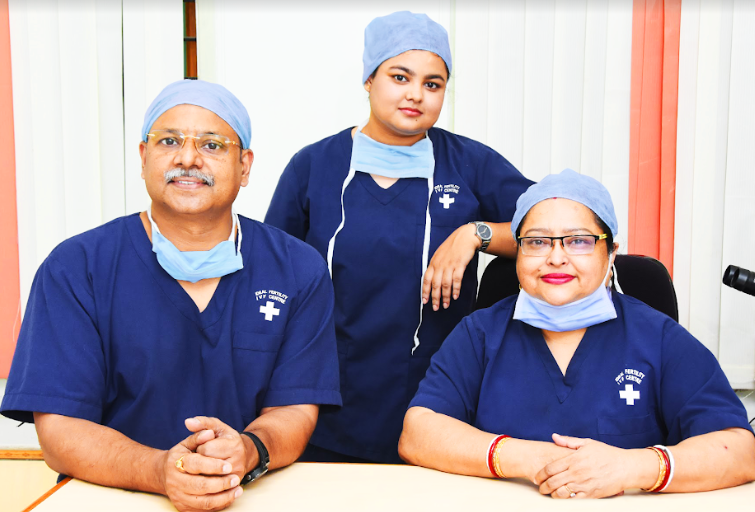FAQS ON INFERTILITY
FREQUENTLY ASKED QUESTIONS
Q. WHY IDEAL FERTILITY SHOULD BE A PREFERRED CHOICE FOR COUPLES FOR INFERTILITY TREATMENT ?
Ans. It is our experience that infertile couples are frustrated and puzzled by different treatments and opinions. They need one to one attention and should have a direct access to care giver ( Doctor, Fertility specialist ),not the counselor. They should have an access to the embryology lab if they wish and they should be the part of whole process in perfect transparent manner. At Ideal Fertility, Jabalpur we try to do this to our utmost efforts. Hence the atmosphere is tension free and relaxed .It increases the co-operation of the couples and helps to improve the success rate and reduce psychological breakdowns.
Q. WHAT IS THE FIRST STAGE OF INFERTILITY TREATMENT?
Ans. The first consultation involves the overall assessment of cause of infertility and next is to get the present fertility status of the couple. Earlier investigations helps a lot . A transvaginal sonography scan gives a great information regarding antral follicles ,lining of uterus, presence of any fibroids. Detailed semen analysis is done and at the same time it is stored. Hysteroscopy is needed where there is any abnormal finding in sonography.
Q. WHAT ARE THE CHARGES FOR IVF AND ICSI TREATMENTS AT IDEAL FERTILITY?
Ans. IVF charges are very reasonable. Call us to know. Usually it includes all ,like drugs ,disposables and tests and sonography examinations. Special discounts are given if female partner is less than 27 yrs and with good antral follicle count ( discretion depends on the physician ).These costs are for one attempt and this information is updated in Jan 2016. For latest, please call us.
Q. WHY ICSI AND IVF TREATMENT IS CHEAPER AT IDEAL FERTILITY, JABALPUR, INDIA. DOES QUALITY GET COMPROMISED ?
Ans. Compromise in quality during IVF treatment never gives success. It is the fees of the physicians that is very low here. As Dr. D’Pankar Banerji ,Gynecologist and his wife Dr.Rinku Banerji,Embryologist at Ideal Fertility are the only doctors to treat infertile couples, the total fees are less. Hence the treatment is cheaper, almost 1/5 th of few centers .
Q. DO YOU HAVE MONEY BACK OFFER ?
Ans. We feel money back offer is a misnomer and we do not believe in that proposition. If the cycle fails, no money is refunded ,but second cycle is done with some discount. ( On sole discretion of Physician ).
Q. WE HAVE A FEAR THAT OTHER PERSON'S SPERMS ARE USED IN IVF OR SPERMS ARE MIXED TO INCREASE THE SUCCESS. IS IT TRUE ?
Ans. When husband is able to provide sperms ,(even in the least quantity), his sperms are used in IVF or in ICSI . Husband’s sperms can even be retrieved from his testicles in cases of Azoospermia. Donor sperms are used only when there is a written consent by the couple.
Q. DO WE NEED HOSPITAL ADMISSION OR THERE IS ANY SORT OF SURGERY DURING THE TREATMENT OF IVF OR ICSI ?
Ans. IVF or ICSI does not need hospital stay or any sort of surgery. During egg retrieval we give general anesthesia ( Inj Propofol ) for 10 – 15 minutes and it is given by qualified anesthesiologist. Eggs are retrieved by simple needle under ultrasound guide.
Q. IF PREGNANCY IS ACHIEVED BY IVF OR ICSI , THEN DO WE NEED BED REST FOR FURTHER PERIOD OF PREGNANCY ?
Ans. Absolute bed rest is not needed but we instruct the female partner to abstain from heavy exhaustive work and avoid intercourse for few weeks.
Q. IS THERE ANY COMPLICATION DURING THE IVF OR ICSI TREATMENT ?
Ans. Complication called Ovarian Hyper Stimulation Syndrome is always feared during this treatment .It is more in younger females and esp. females with Polycystic Ovaries. To avoid that, treating physician always keeps a check on growing follicles and titrates the doses of Gonadotropins. If it is still imminent ,then we do not transfer the embryos in that particular cycle and Freeze them to transfer later on. Chances of this complications are very low and usually treated in a conservative manner.
Q. WHY IVF FAILS ?
Ans. IVF fails mainly because of two reasons .One is due to quality of eggs and second is failure of implantation. These things happens in natural pregnancies also ,but as there is cost involvement in IVF ,so it pinches. Quality of stimulation and quality of embryology matters a lot .But these can be corrected by taking stringent measures but quality of eggs and implantation is still beyond anybody’s approach.
Q. HOW MANY DAYS ARE REQUIRED FOR IVF OR ICSI TREATMENT ?
Ans. Treatment requires 30 days , from start of injection of down regulation to embryo transfer.
Q. WHEN EGG DONATION IS ADVISED ?
Ans. It is advised when the female partner’s age is around 40 or she is having premature menopause
Q. WHAT IS INFERTILITY ?
Ans. Infertility can be defined as the inability of married couples to attain conception after one year or more of regular, unprotected coitus.
Q. HOW LONG A COUPLE SHOULD WAIT TO GO FOR FERTILITY TREATMENT?
Ans. For normal couples the chance of achieving a successful pregnancy is
- 20 % for any given month
- 57% within three months of trying
- 75 % within six months
- 90 % within one year
- 95 % with in two years of attempting pregnancy
Hence a general rule is if couple does not achieve a pregnancy within one year ,they should go for finding out the reasons of infertility.
Q. WHAT IS THE FREQUENCY OF COUPLES SUFFERING FROM INFERTILITY ?
Ans. One in six couples attempting pregnancy will have difficulty achieving pregnancy.
Q. HOW MUCH THE MEN OR WOMEN ARE RESPONSIBLE FOR INFERTILITY?
Ans. That is almost equal ,in 30 % both are responsible
Q. HOW THE AGE OF PARTNERS AFFECTS ACHIEVING A PREGNANCY ?
Ans. Achieving a successful pregnancy declines with age.
- Fertility declines in men after age 50
- Fertility declines in women after age 30
- 4 % of women before age 25 have difficulty achieving a successful pregnancy .
- 13 % of women age 26-34 have difficulty having a baby.
- 25 % of women have difficulty conceiving between the ages of 35-39
- By the age 40, 34 % of women attempting pregnancy will have difficulty achieving pregnancy.
Q. HOW A COUPLE CAN GET AN IDEA THAT THEIR FERTILITY TREATMENT WILL HAVE BETTER CHANCE OF ACHIEVING PREGNANCY?
Ans. Success in Fertility treatment s largely depend on ovarian reserve of the female partner. Ovarian reserve is best assessed by Day2 vaginal sonography . It is the number of small resting follicles gives the idea about how many eggs are going too be retrieved during IVF. Other tests are Day2 /3 FSH, AMH and inhibit assays. Day2/Day3 FSH are more frequently used.
Q. WHAT ARE THE MAIN FACTORS CAUSING INFERTILITY ?
Ans.. In Females : Causes could be
- Irregular ovulation or egg production , hormonal imbalance 30 %
- Tubal Block 30 %
- Problems in uterus like fibroids ,adhesions, defect in uterine lining called synechae, endometriosis and congenital anomalies 30 %
- Unexplained 30 %
In Males : Causes might be
- Low sperm count with or without low motility.
- Absence of vas deference (tube carrying the sperms ), testicular abnormality , and hormonal imbalance.
- Absence of sperms ( azoospermia ) Obstructive or Non obstructive
Q. DOES THE BLOOD GROUP OF THE COUPLE AFFESTS THE FERTILITY ?
Ans. Blood group is not the cause of infertility.
Q. SEMEN LEAKS OUT AFTER INTERCOURSE, DOES IT AFFECT IN ACHIEVING THE PREGNANCY ?
Ans. Volume of the semen is more than the capacity of vagina. Hence part of the semen comes out. Semen is ejaculated in sperts. The first spert is usually during deep penetration and is richest in sperms ( least seminal water ).It gets sprayed over the mouth of uterus ( external os ). Hence nature made an arrangement that sperm should enter the cervical canal and plasma is thrown out
Q. DOES MASTURBATION IN YOUNG AGE AFFECTS THE MALE FERTILITY STATUS OR SEXUAL POTENTIAL ?
Ans. Masturbation is rather a good indicator that the male is normal. You can never run out of sperms only because you masturbated. Excessive masturbation may affect the timed intercourse because of flaccidity of penis.
Q. IS IMPOTENCY AND INFERTILITY SAME REFERRING TO A MALE ?
Ans. Impotent ,usually means a male who can not perform sex, but he may have good number of sperm to create a baby if injected artificially.
In the same way a person may be very good at sex ,but may be azoospermic .
Hence virility and sperm productions are two departments. If testis are very small or damaged in any way may cause infertility and impotency both.
Q. OVULATION INDUCING DRUGS MAY CAUSE OVARIAN CANCER IN WOMEN ?
Ans. Executive ovulation may be a factor but it is not yet clearly established that these drugs may cause cancer.
Q. IVF OR ICSI BABIES ARE HAVING MORE DANGER OF AFFECTED BY GENETIC DISORDERS ?
Ans. Definitely there is concern ,as these methods are not natural . But till date there is no clear cut correlation between these method and genetic diseases compared to population. It is a protective phenomenon of nature to go for the best selection of the pregnancies either achieved naturally or by artificial means. Abnormal fetuses are usually aborted whether they are created by natural intercourse or by ART ( assisted Reproductive techniques )
Q. WHAT ARE ART ( ASSISTED REPRODUCTIVE TECHNIQUES ) ?
Ans. It is wide range of Fertility Treatments . Most widely known is IVF ( in-vitro fertilization ) and ICSI
( Intra-cytoplasmic sperm injection )
Others are IUI ( Intrauterine Insemination ) ,GIFT ( Gamete Intra-fallopian Transfer ),
TET ( Tubal Embryo Transfer ) , DEP ( Donor Egg Program ) .
Q. WHAT IS THE LEGAL ASPECT OF IVF INDIA ?
Ans. At present in India, (2006)Laws regarding ART procedures. are under framing.

